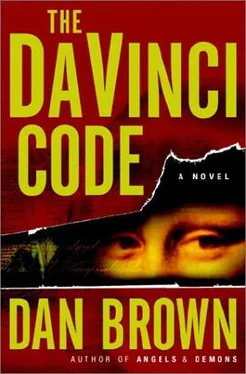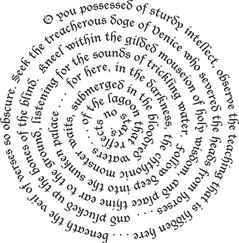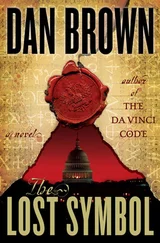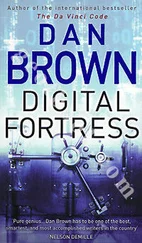Dan Brown - The Da Vinci Code
Здесь есть возможность читать онлайн «Dan Brown - The Da Vinci Code» весь текст электронной книги совершенно бесплатно (целиком полную версию без сокращений). В некоторых случаях можно слушать аудио, скачать через торрент в формате fb2 и присутствует краткое содержание. ISBN: , Жанр: Исторический детектив, Политический детектив, на английском языке. Описание произведения, (предисловие) а так же отзывы посетителей доступны на портале библиотеки ЛибКат.
- Название:The Da Vinci Code
- Автор:
- Жанр:
- Год:неизвестен
- ISBN:0-385-50420-9
- Рейтинг книги:3 / 5. Голосов: 1
-
Избранное:Добавить в избранное
- Отзывы:
-
Ваша оценка:
- 60
- 1
- 2
- 3
- 4
- 5
The Da Vinci Code: краткое содержание, описание и аннотация
Предлагаем к чтению аннотацию, описание, краткое содержание или предисловие (зависит от того, что написал сам автор книги «The Da Vinci Code»). Если вы не нашли необходимую информацию о книге — напишите в комментариях, мы постараемся отыскать её.
The Da Vinci Code — читать онлайн бесплатно полную книгу (весь текст) целиком
Ниже представлен текст книги, разбитый по страницам. Система сохранения места последней прочитанной страницы, позволяет с удобством читать онлайн бесплатно книгу «The Da Vinci Code», без необходимости каждый раз заново искать на чём Вы остановились. Поставьте закладку, и сможете в любой момент перейти на страницу, на которой закончили чтение.
Интервал:
Закладка:
Castigo corpus meum.
Finally, he felt the blood begin to flow.
CHAPTER 3
The crisp April air whipped through the open window of the Citroën ZX as it skimmed south past the Opera House and crossed Place Vendôme. In the passenger seat, Robert Langdon felt the city tear past him as he tried to clear his thoughts. His quick shower and shave had left him looking reasonably presentable but had done little to ease his anxiety. The frightening image of the curator’s body remained locked in his mind.
Jacques Saunière is dead.
Langdon could not help but feel a deep sense of loss at the curator’s death. Despite Saunière’s reputation for being reclusive, his recognition for dedication to the arts made him an easy man to revere. His books on the secret codes hidden in the paintings of Poussin and Teniers were some of Langdon’s favorite classroom texts. Tonight’s meeting had been one Langdon was very much looking forward to, and he was disappointed when the curator had not shown.
Again the image of the curator’s body flashed in his mind. Jacques Saunière did that to himself? Langdon turned and looked out the window, forcing the picture from his mind.
Outside, the city was just now winding down – street vendors wheeling carts of candied amandes , waiters carrying bags of garbage to the curb, a pair of late night lovers cuddling to stay warm in a breeze scented with jasmine blossom. The Citroën navigated the chaos with authority, its dissonant two-tone siren parting the traffic like a knife.
« Le capitaine was pleased to discover you were still in Paris tonight,» the agent said, speaking for the first time since they’d left the hotel. «A fortunate coincidence.»
Langdon was feeling anything but fortunate, and coincidence was a concept he did not entirely trust. As someone who had spent his life exploring the hidden interconnectivity of disparate emblems and ideologies, Langdon viewed the world as a web of profoundly intertwined histories and events. The connections may be invisible , he often preached to his symbology classes at Harvard, but they are always there , buried just beneath the surface.
«I assume,» Langdon said,» that the American University of Paris told you where I was staying?» The driver shook his head. «Interpol.» Interpol , Langdon thought. Of course. He had forgotten that the seemingly innocuous request of all European hotels to see a passport at check-in was more than a quaint formality – it was the law. On any given night, all across Europe, Interpol officials could pinpoint exactly who was sleeping where. Finding Langdon at the Ritz had probably taken all of five seconds.
As the Citroën accelerated southward across the city, the illuminated profile of the Eiffel Tower appeared, shooting skyward in the distance to the right. Seeing it, Langdon thought of Vittoria, recalling their playful promise a year ago that every six months they would meet again at a different romantic spot on the globe. The Eiffel Tower, Langdon suspected, would have made their list. Sadly, he last kissed Vittoria in a noisy airport in Rome more than a year ago.
«Did you mount her?» the agent asked, looking over.
Langdon glanced up, certain he had misunderstood. «I beg your pardon?»
«She is lovely, no?» The agent motioned through the windshield toward the Eiffel Tower. «Have you mounted her?»
Langdon rolled his eyes. «No, I haven’t climbed the tower.» «She is the symbol of France. I think she is perfect.» Langdon nodded absently. Symbologists often remarked that France – a country renowned for machismo, womanizing, and diminutive insecure leaders like Napoleon and Pepin the Short – could not have chosen a more apt national emblem than a thousand-foot phallus.
When they reached the intersection at Rue de Rivoli, the traffic light was red, but the Citroen didn’t slow. The agent gunned the sedan across the junction and sped onto a wooded section of Rue Castiglione, which served as the northern entrance to the famed Tuileries Gardens – Paris’s own version of Central Park. Most tourists mistranslated Jardins des Tuileries as relating to the thousands of tulips that bloomed here, but Tuileries was actually a literal reference to something far less romantic. This park had once been an enormous, polluted excavation pit from which Parisian contractors mined clay to manufacture the city’s famous red roofing tiles – or tuiles.
As they entered the deserted park, the agent reached under the dash and turned off the blaring siren. Langdon exhaled, savoring the sudden quiet. Outside the car, the pale wash of halogen headlights skimmed over the crushed gravel parkway, the rugged whir of the tires intoning a hypnotic rhythm. Langdon had always considered the Tuileries to be sacred ground. These were the gardens in which Claude Monet had experimented with form and color, and literally inspired the birth of the Impressionist movement. Tonight, however, this place held a strange aura of foreboding.
The Citroën swerved left now, angling west down the park’s central boulevard. Curling around a circular pond, the driver cut across a desolate avenue out into a wide quadrangle beyond. Langdon could now see the end of the Tuileries Gardens, marked by a giant stone archway.
Arc du Carrousel.
Despite the orgiastic rituals once held at the Arc du Carrousel, art aficionados revered this place for another reason entirely. From the esplanade at the end of the Tuileries, four of the finest art museums in the world could be seen… one at each point of the compass.
Out the right-hand window, south across the Seine and Quai Voltaire, Langdon could see the dramatically lit facade of the old train station – now the esteemed Musée d’Orsay. Glancing left, he could make out the top of the ultramodern Pompidou Center, which housed the Museum of Modern Art. Behind him to the west, Langdon knew the ancient obelisk of Ramses rose above the trees, marking the Musée du Jeu de Paume.
But it was straight ahead, to the east, through the archway, that Langdon could now see the monolithic Renaissance palace that had become the most famous art museum in the world.
Musée du Louvre.
Langdon felt a familiar tinge of wonder as his eyes made a futile attempt to absorb the entire mass of the edifice. Across a staggeringly expansive plaza, the imposing facade of the Louvre rose like a citadel against the Paris sky. Shaped like an enormous horseshoe, the Louvre was the longest building in Europe, stretching farther than three Eiffel Towers laid end to end. Not even the million square feet of open plaza between the museum wings could challenge the majesty of the facade’s breadth. Langdon had once walked the Louvre’s entire perimeter, an astonishing three-mile journey.
Despite the estimated five days it would take a visitor to properly appreciate the 65, 300 pieces of art in this building, most tourists chose an abbreviated experience Langdon referred to as “Louvre Lite” – a full sprint through the museum to see the three most famous objects: the Mona Lisa , Venus de Milo , and Winged Victory. Art Buchwald had once boasted he’d seen all three masterpieces in five minutes and fifty-six seconds.
The driver pulled out a handheld walkie-talkie and spoke in rapid-fire French. « Monsieur Langdonest arrivé. Deux minutes. »
An indecipherable confirmation came crackling back.
The agent stowed the device, turning now to Langdon. «You will meet the capitaine at the main entrance.»
The driver ignored the signs prohibiting auto traffic on the plaza, revved the engine, and gunned the Citroën up over the curb. The Louvre’s main entrance was visible now, rising boldly in the distance, encircled by seven triangular pools from which spouted illuminated fountains.
Читать дальшеИнтервал:
Закладка:
Похожие книги на «The Da Vinci Code»
Представляем Вашему вниманию похожие книги на «The Da Vinci Code» списком для выбора. Мы отобрали схожую по названию и смыслу литературу в надежде предоставить читателям больше вариантов отыскать новые, интересные, ещё непрочитанные произведения.
Обсуждение, отзывы о книге «The Da Vinci Code» и просто собственные мнения читателей. Оставьте ваши комментарии, напишите, что Вы думаете о произведении, его смысле или главных героях. Укажите что конкретно понравилось, а что нет, и почему Вы так считаете.










